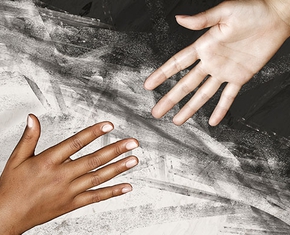The views expressed in our content reflect individual perspectives and do not represent the authoritative views of the Baha'i Faith.
In that sacred and transforming process of life we call marriage, a couple begins to bond eternally and to build a new and prospering family.
That journey brings surprises and challenges at every step—and while many marriages last a lifetime, others falter along the way.
The characteristics and strengths of Baha’i marriage and family life, in addition to the Baha’i principle of equality of rights of women and men, relies on the depth of unity and love between the members of the family. In a marriage where unity becomes the hallmark of the life of a couple, different ideas and habits are more likely to be resolved with forbearance and wisdom:
The fundamental purpose animating the Faith of God and His Religion is to safeguard the interests and promote the unity of the human race … – Baha’u’llah, Gleanings from the Writings of Baha’u’llah, p. 215.
Of course, people have different cultural and social perspectives about unity in a marriage. But across all cultures and societies, two powerful forces help build a strong and happy marital life: physical and spiritual bonding.
In some cultures, especially in the West, we place excessive emphasis on physical attraction as the dominant force in marital life. But physical attraction, important as it can be, is temporary and superficial. It will also inevitably be tested with the passage of time, and as they become more familiar with each other’s positive and negative habits and behaviors, especially when they are confronted with difficulties and crises in their marital life. Unless the couple has a deeper understanding of the spiritual meaning and purpose of marriage as an institution, they will tend towards seeing the negative aspects in each other, and consequently their relationship may turn sour and lead to disunity and conflict.
The Baha’i teachings explain that the physical bond alone will not last, as it is foredoomed to separation at the end, emphasizing that:
… marriage must be a union of the body and the spirit as well … so that throughout every phase of life, and in all the worlds of God, their union endure; for this real oneness is a gleaming out of the love of God. – Abdu’l-Baha, Selections from the Writings of Abdu’l-Baha, pp. 117-118.
The spiritual relationship between the couple strengthens the marriage as a lasting stronghold, because human beings are basically spiritual:
The foundation of the Kingdom of God is based upon harmony and love … not upon differences, especially between husband and wife. – Abdu’l-Baha, Baha’i Marriage and Family Life, p. 9.
But what is true love and what is not? True love is deep and authentic love coming from the heart between spouses. It goes beyond physical beauty, charm and attraction. It is closely connected to our higher or spiritual nature. It is a heavenly bonding which is not a material product of consumer culture, nor is it swayed by the force of selfishness. True love, the Baha’i teachings say:
… is prompted by the ideal of unity of spirits. This love is attained through the knowledge of God, so that men see the Divine Love reflected in the heart. Each sees in the other the Beauty of God reflected in the soul … This love will bring the realization of true accord, the foundation of real unity. – Abdu’l-Baha, Paris Talks, pp. 180-181.
What is not love but rather mere fascination?
… the love which sometimes exists between friends is not (true) love, because it is subject to transmutation; this is merely fascination … it is merely acquaintanceship; it is subject to change. – Ibid.
In such individuals emotion often tends to dominate reason and obscure the ultimate purpose of marriage and family life.
When marriage is not founded on wisdom, moral principles and spiritual insight, it is bound to perish. Some studies show that among the top most prevalent causes of separation and divorce in marriage in the western world are infidelity, financial problems and poor communication between spouses. Domestic violence is also common. In a world where the sanctity of marriage has suffered, the Baha’i writings uphold and strengthen marriage and family life, exalting it as a “sacred institution” and a “fortress of well-being.” Marriage, like any living thing, needs careful and patient attention. Abdu’l Baha said:
You must irrigate continually the tree of your union with the water of love and affection, so it may remain green and verdant throughout all the seasons. – Star of the West, Volume 6, p. 20.
Abdu’l-Baha counseled married couples that their life together should resemble “the angels in heaven” and that they should demonstrate “a life full of joy and spiritual delight, a life of unity and concord, a friendship both mental and physical.” When the news of the wedding of a young couple reached him, for example, he responded that their union, “… imparted infinite joy and gratitude. Praise be to God, those two faithful birds have sought shelter in one nest.” – Selections from the Writings of Abdu’l-Baha, p. 120. If a couple live in this spirit of love and as helpmates and intimate friends, he added:
… they will pass through this world with perfect contentment, bliss, and peace of heart, and become the object of divine grace and favours in the Kingdom of heaven. – Ibid., p. 122.
















Comments
Sign in or create an account
Continue with Googleor